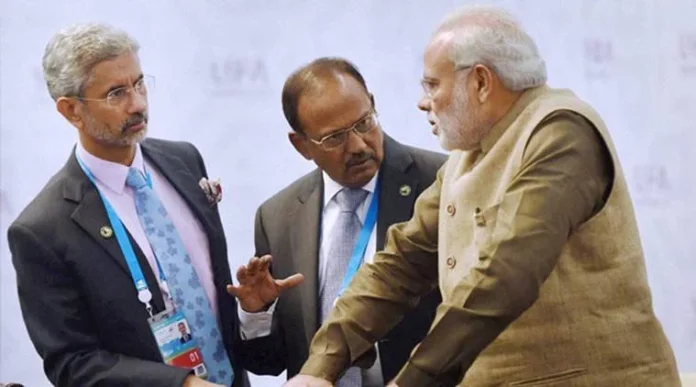It seems quite a paradox that even 75 years after independence, India does not possess an overarching National Security Strategy (NSS), which comprehensively tries to gauge the challenges to the country’s security and spells out policies to deal with them effectively.
To follow on its national vision and to ensure the country’s ability to defend itself, a national strategy is a must. In addition, this strategy should have an overarching holistic view of the various internal and external threats to the country, a holistic view of its defence forces, besides building a well-coordinated defence apparatus.
In addition, this strategy should be formulated within the boundaries of the Constitution of India and the country’s democratic political system.
Why a National Security Strategy?
The need for a comprehensive NSS is underlined by the need of addressing complex inter-relationships between domestic and external threats, which should be analysed properly and a coordinated policy response is devised to handle them.
Ever nation confronts multiple and simultaneous challenges across several security domains. In order to safeguard its interest every nation in this globalised world, should realise that the line between domestic and external threats is becoming increasingly blurred. For many nations, terrorism is a threat to domestic security but it may have external links or genesis. Thus, a combination of domestic and external interventions might be necessary to counter it.
The NSS would ensure that a balance is maintained between enhanced security and the citizens’ rights, as guaranteed by the Constitution, and this needs to be clearly spelt out, so that national security, per se doesn’t transform into a state keeping tabs on its citizens.
NSS for India needs to take a comprehensive approach, encompassing domestic and external and economic and ecological challenges, highlighting the inter-linkages and feedback system among them and on that basis formulate a coherent template for multi-disciplinary and multi-sectoral interventions, focussing on ensuring the prosperity of its citizens in order to meet its quest for transforming the lives of every Indian.
Challenges before India
We have to view the challenges for India’s security through the geo-political prism. The Asia-Pacific is becoming the new economic and political centre of gravity of the world and various players in the region include China, Pakistan, Iran, Indonesia, Malaysia, South Korea, Vietnam and Japan.
For India the two greatest challenges come from China and Pakistan, so India’s NSS will have to incorporate devising a challenging security counter to these two, firstly. Then it will have to try to fit in into the security policies of the global players like US, UK, France and other European nations.
China’s rise, both economically and militarily is the foremost challenge, which could derail the plans of the Indian establishment to change its economic standing, ensuring a better life for its citizens. It is in our interest to create, to the extent possible, an external environment that enables the transformation of India.
Currently, Pakistan does not seem to be a strategic defence threat to India unless it is able to exploit religious fissures in our society. But, when pondering over the Pakistan question, we also will have to include China in that paradigm. At present China is boosting Pakistan’s capabilities, contributing as a reliable partner in virtually every sphere, be it building up her defences, contributing to its nuclear programme and also its economic viability through CPEC.
The India – China relations are not just confined to the boundary issue with its eastern neighbour but they also encompass the economic activities. A big percentage of our trade flow passes through the South China Sea, thus we’ll have to ensure the peaceful environment in this region and that’s why India has been an active partner in the US-led QUAD, besides other bilateral agreements with other South-Asian nations. In addition, India has to be cautious on the most active cyber security and espionage front also in the region.
American and Chinese NSS
If we analyse the American and Chinese NSS, then we realise that both nations have a very well laid out and detailed security plan to ensure their defence and also measures to take place to counter other threats, be they economic, cultural and bilateral.
The US’s NSS comprehensively provides an outline of the strategic vision of its current administration, provides further clarity and direction on various policy verticals by the Biden administration and marks the end of political expectations and uncertainties about presidential doctrines in the US.
Besides, catering to the wide-ranging demands of internal and external security, simultaneously, it identifies the three main fulcrums of its strategy as; Invest, Build and Modernise. It seeks to invest in the “tools of American power and influence, by strengthening the economy at home and improving its critical infrastructure and investing in technologies such as microchips and semiconductors.
As regards India, it considers it both as a bilateral and multilateral partner in the Indo-Pacific, wants it to be integrated at important global forums such as the G-7, and views it as the largest democracy and a major defence partner.
China’s Defensive National Defence Policy in the New Era, as enumerated by its Defence Ministry says that China will pursue a national defence policy that is defensive in nature. It will resolutely be safeguarding China’s sovereignty, security and development interests. It additionally lists out the hot spots for China, its interest in the region and globally and it reiterates its sovereign claim on territories besides supporting the sustainable development of the country. It reiterates its commitment to peace, but couched in its own wordings. The NDP outlines its military strategic guideline for a new era, adhering to the principles of defence, self-defence and post-strike response, and adopts active defence, in addition to responding to the security threats facing the country effectively and building its military the Chinese way.
As regards its military power, it vows to generally achieve mechanisation by the year 2020 with significantly enhanced informationisation (sic) and greatly improved strategic capabilities; to comprehensively advance the modernisation of military theory, organisational structure, military personnel, and weaponry and equipment in step with the modernisation of the country and basically complete the modernisation of national defence and the military by 2035; and to fully transform the people’s armed forces into world-class forces by the mid-21st century.
Mention here should also be made of Pakistan, which adopted a NSS, for the first time in 2022. That also raises the bar for India to start working on those lines.
Key Elements for Indian NSS
We live in an uneasy neighbourhood. To our west and north, India has unsettled borders that could be a flashpoint for future conflicts, to our east there is a potential danger of refugee influx, and to our south is the Indian Ocean that is becoming an arena for strategic rivalry. There are continuing internal conflicts in parts of India that are increasingly playing out in social media with the prospective danger of dividing communities.
To ensure a secure and stable India that can guarantee safety and prosperity to its people, India’s national security objectives could be defined as: Protecting India’s national sovereignty, securing the territorial integrity of India, promoting India’s rise to its rightful place in international affairs, ensuring a peaceful internal environment within India, creating a climate for our citizens that is just, equitable, prosperous, and shields them from risks to life and livelihood.
Flowing from these objectives are the tenets of our Security Strategy. These tenets lay down our fundamental approach to achieving holistic national security for India. These are, assuming our rightful place in global affairs, achieving a secure neighbourhood, peaceful resolution of internal conflicts, protecting our people, and strengthening our capabilities, both defence and economic.
In a democracy, an NSS should be citizen-centric and must reflect the values and beliefs of the people; at the same time, it must seek to raise public awareness of and shape public perceptions about national security issues.
The NSS must take the Constitution of India as its guide and its objective should be the safeguarding and consolidation of India’s democracy.
Previous exercises undertaken to promote national security could serve as useful reference material for the NSS. These include the Kargil Review Committee report (2000), the Report of the Naresh Chandra Task Force on Security (2012), and the document entitled ‘Building Comprehensive National Power: Towards an Integrated National Security Strategy’ prepared by the National Security Advisory Board (2015).
A well-informed, vigilant and educated public opinion is the best assurance of national security besides having a clarity of direction and delivery.
-The writer is a political commentator based in New Delhi. He can be contacted on www.asadmirza.in. The views expressed are personal and do not necessarily reflect the views of Raksha Anirveda
-The writer is a New Delhi-based senior commentator on international and strategic affairs, environmental issues, an interfaith practitioner, and a media consultant. The views expressed are personal and do not necessarily carry the views of Raksha Anirveda














